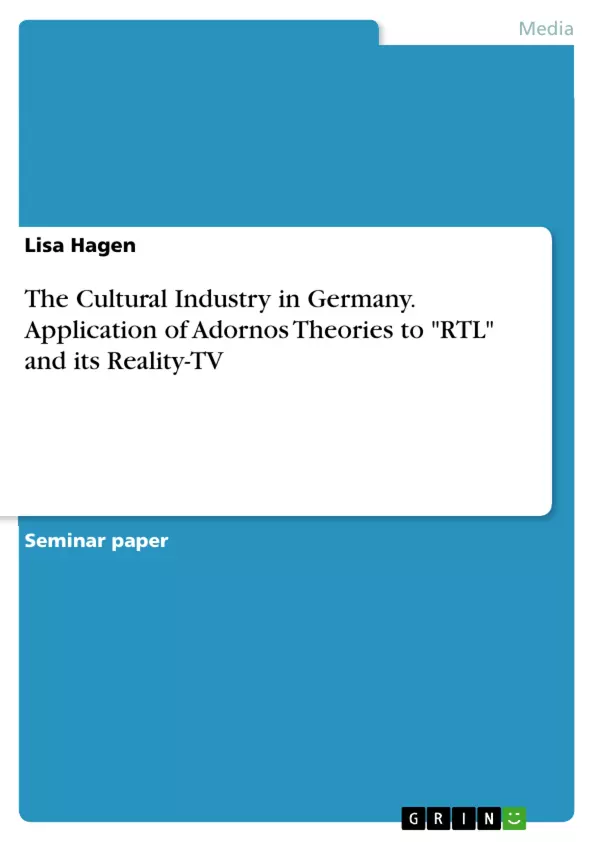This papers purpose is to analyse the genre of Reality TV and find certain patterns which help these shows to be successful. Furthermore, this article deals with one of the most known theories in terms of culture industry. The German philosopher and sociologist Adorno advocates a very pessimistic view on this phenomenon, which is applied here as vehicle to classify the private channel „RTL“ and its program offerings, especially Reality TV. This paper wants to find out if his gloomy ideas became realized there.
Reality TV is a hybrid genre which merges authenticity with production. As the name implies, it suggests an attempt to portray reality through the medium of television. These programs are made to overcome the scripted nature of television shows and their predetermined endings by "real people" in "real situations" which should evoke the feeling of honest. But this “reality” is only partly true.
Inhaltsverzeichnis (Table of Contents)
- Introduction
- Introduction of Reality-TV
- Reality TV in Germany
- Reality TV Programs based on the Evolvement of Romantic Relationships
- Reality TV Programs based on Surveillance
- Reality TV and its interconnections
- Discussion - Are Adorno's Dystopian Ideas realized in „RTL“?
- Conclusion
Zielsetzung und Themenschwerpunkte (Objectives and Key Themes)
This paper aims to analyze the genre of reality TV and identify patterns contributing to its success. It also examines the applicability of Adorno's cultural industry theory to the private channel "RTL" and its reality TV programming. The goal is to determine if Adorno's pessimistic views on the culture industry are realized in "RTL's" programming.
- The rise and characteristics of Reality TV
- The influence of "RTL" on German television and culture
- The perception of Reality TV as "Trash TV"
- The application of Adorno's cultural industry theory to "RTL" and its programming
- The blurring of lines between reality and media production in reality TV
Zusammenfassung der Kapitel (Chapter Summaries)
- Introduction: Introduces the evolution of television entertainment in Germany, specifically the rise of Reality TV as a prominent genre, and sets the stage for analyzing "RTL" and its reality TV offerings through the lens of Adorno's cultural industry theory.
- Introduction of Reality-TV: Defines Reality TV as a hybrid genre merging authenticity with production, highlighting its attempt to portray reality through the medium of television. Discusses the blurred lines between reality and media production, the role of the audience as both consumers and actors in the narrative, and the power dynamics between producers and participants.
- Reality TV in Germany: Introduces "RTL" as a key player in the German reality TV landscape and discusses its significant impact on television and culture. Highlights the perception of Reality TV as "Trash TV" and the critical reception of "RTL's" programming.
Schlüsselwörter (Keywords)
This paper examines the evolution of reality TV, specifically in Germany, focusing on "RTL" and its impact on German culture. Key concepts include: reality television, culture industry, "Trash TV," Adorno, "RTL," celebrification, and the blurring of lines between reality and media production.
Frequently Asked Questions
What is Adorno's theory of the "Culture Industry"?
Adorno argues that culture has become an industry that produces standardized, mass-consumed goods (like TV shows) which manipulate the public into passivity and conformity.
How does Reality TV merge authenticity with production?
Reality TV portrays "real people" in "real situations" to evoke honesty, but these situations are often scripted, edited, or manufactured by producers to ensure entertainment value.
Why is "RTL" a focus of this study?
RTL is a leading private channel in Germany known for its extensive Reality TV programming, often criticized as "Trash TV," making it an ideal subject for testing Adorno's dystopian ideas.
What is "Trash TV"?
"Trash TV" is a pejorative term for low-quality television programs that rely on sensationalism, voyeurism, and the public display of personal conflicts for ratings.
Does the study conclude that Adorno's ideas are realized in modern TV?
The paper explores this by analyzing how Reality TV on channels like RTL blurs the lines between reality and media production, potentially fulfilling Adorno's pessimistic predictions.
- Quote paper
- Lisa Hagen (Author), 2019, The Cultural Industry in Germany. Application of Adornos Theories to "RTL" and its Reality-TV, Munich, GRIN Verlag, https://www.hausarbeiten.de/document/1333702


